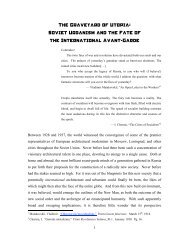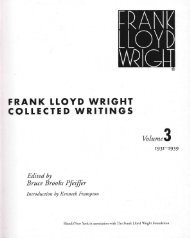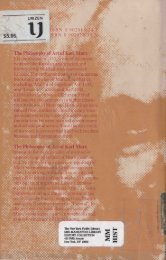MEMORIES OF THE FUTURE - The Charnel-House
MEMORIES OF THE FUTURE - The Charnel-House
MEMORIES OF THE FUTURE - The Charnel-House
You also want an ePaper? Increase the reach of your titles
YUMPU automatically turns print PDFs into web optimized ePapers that Google loves.
well as the future humanity would thereby attain — only became possible with the adventof modernity. 7 This vision of the future (which, as Bifo observes, now merged with priorcategories of utopia) 8 thus owed in no small part to “the considerable speeding up of thepace of social change.” 9At this point, the eschatological “world to come” prophesied by religion was divestedof its supernatural character, descending from the clouds of heaven above to find its placeon the solid ground of earth below. <strong>The</strong> celestial became terrestrial. Utopia was torn outof its conceptual “nowhere” in the brains of philosophers and transplanted into politicalprograms for the here-and-now. Neverland left the pens of novelists and fell within thescope of the not-so-distant future. <strong>The</strong> absolutes of religion, philosophy, and art becameworldly. Modernity removed these ideals from the timeless space of eternity, projectingthem onto the temporal horizon of the future. Bifo is therefore correct to specify:<strong>The</strong> rise of the myth of the future is rooted in modern capitalism, in the experience of expansion ofthe economy and knowledge. <strong>The</strong> idea that the future will be better than the present is not anatural idea, but the imaginary effect of the peculiarity of the bourgeois production model…In thesecond part of the nineteenth century, and in the first part of the twentieth, the myth of the futurereached its peak,…based on the concept of “progress,” the ideological translation of the reality ofeconomic growth. Political action was reframed in the light of this faith in the progressive future.Liberalism and social democracy, nationalism and communism, and anarchism itself…share acommon certainty: notwithstanding the darkness of the present, the future will be bright. 107“Progress opened up a future that transcended the…predictable, natural space of time and experience…<strong>The</strong> future contained in this progress is characterized by two main features: first, the increasing speed withwhich it approaches us, and second, its unknown quality.” Koselleck, Reinhart. “On the Relation of Pastand Future in Modern History.” Translated by Keith Tribe. Futures Past: On the Semantics of HistoricalTime. (Columbia University Press. New York, NY: 2004). Pg. 22.8 “<strong>The</strong> idea of the future is central to the ideology and energy of the twentieth century, and in many ways itis mixed with the idea of utopia.” Berardi, After the Future. Pg. 17.9 “<strong>The</strong> decisive threshold had been passed when change began to be ascertainable and measurable by thescale of an individual lifespan; when in the course of a single individual life the change was evident enoughto demand a drastic adjustment of cognitive and moral standards. <strong>The</strong>n it was duly reflected in the new andnovel sense of history as an endless chain of irreversible changes, with which the concept of progress — adevelopment which brings change for the better — was not slow to join forces.” Bauman, Zygmunt.Socialism: <strong>The</strong> Active Utopia. (Routledge. New York, NY: 2010). Pgs. 18-19.10 Berardi, After the Future. Pg. 18.5






